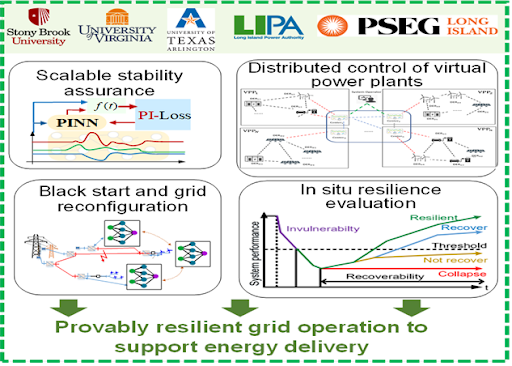Electric Grid Projects
Enhancing the Navy’s energy infrastructure to become more robust and resilient — able to prevent, withstand, respond to, and recover rapidly from disruptions, to preserve critical mission readiness and essential support capability — has become a higher strategic priority as climate change accelerates, cybersecurity threats increase, and cleantech offers new innovative solutions. The complexity of energy delivery systems does not lend itself to simple solutions and requires detailed analysis and new understanding of operating data, leading to innovative solutions that can deal with a rapidly changing operating environment. This project stems from prior ONR work by the principal partners, Stony Brook University and the University of Massachusetts Lowell, and is motivated by Presidential, DOD and DON strategy guidance. To ensure a close alignment with market realities, the two universities are also partnering with major Northeastern utilities and companies serving the energy industry.
Principle Investigator - Dr. Yacov Shamash
Sponsor - US Navy Office of Naval ResearchThis proposed project aims to conduct (1) a systematic comparative study of different HVDC architectures, (2) develop an extended bandwidth model for coupled HVDC system simulation, and (3) perform OSW HVDC benchmarking in software and HIL platforms. The research team will also leverage its existing efforts to explore cross-platform networked simulation/research concepts for OSW research integration.
In addition to the technical tasks, the research team will also conduct a marketing study report focused on the Long Island, New York City downstate region for the HVDC technology competitiveness including market size and value, the current IP landscape, opportunities for NY businesses, technology providers and competition strategy options.
Principle Investigator - Dr. Fang Luo
Sponsor - Sunrise Wind LLCTo tackle the unprecedented challenges due to ultra-scale offshore wind integration, this project focuses on the development of high voltage direct current (HVDC) offshore grid technologies to enable resilient and secure renewable pathways in New York and neighboring regions. The overarching goal is to relieve congestions in transmission corridors and mitigate various security constraints that could block wind power from being delivered to load centers. To this end, our team will (1) establish resilience-enabling, grid-forming controls in HVDC offshore grids; (2) enable mesh-ready and meshed HVDC offshore networks for provably flexible and resilient offshore wind generation and delivery; and (3) leverage hydrogen integration to further eliminate bottlenecks and strengthen the weak grids via offshore wind energy hubs.
Principle Investigator - Dr. Peng Zhang
Sponsor - Sunrise Wind LLCThis project is directed to the development of coordinated networked microgrids (NMs) that promise to significantly enhance power grid reliability. The project collaborates with industry partners, RLC Engineering, PLLC, Commonwealth Edison Company, and the Epic Institute. Three main challenges prevent the wide adoption of NMs: 1) lack of understanding of NM dynamics; 2) big data but limited/unscalable analytics; 3) cyber-infrastructure bottlenecks.
Principle Investigator - Dr. Peng Zhang
Sponsor - National Science FoundationThis project integrates SBU’s unique techniques – programmable active security scanning, crypto-control, and software-defined microgrid controls (including push-sum-enabled distributed algorithms) – to enable self-protecting, cyber-physical-resilient, and intelligent microgrids. Being affordable, lightweight, secure and plug-and-play, our cybersecurity tool can flexibly transform ship and base-level power infrastructures into resilient microgrids that are immune to attacks, faults, and disasters.
 Architecture of PASS diagram
Architecture of PASS diagramPrinciple Investigator - Dr. Peng Zhang
Sponsor - US Navy Office of Naval ResearchThis project's focus is to demonstrate a holistic distribution-microgrid solution to bolstering grid resilience and converting renewables into reliable resilience resources. Severe threats from extreme weather events and physical/cyberattacks launched by adversaries further stress the Navy’s grids. To address these challenges, a resilience-enabling distribution-microgrid management platform will be demonstrated, in collaboration with the power industry, to ensure resilient integration of massive renewable energy resources and AI-enabled operations.
 Microgrid Operation Diagram
Microgrid Operation DiagramPrinciple Investigator - Dr. Peng Zhang
Sponsor - US Navy Office of Naval Research
